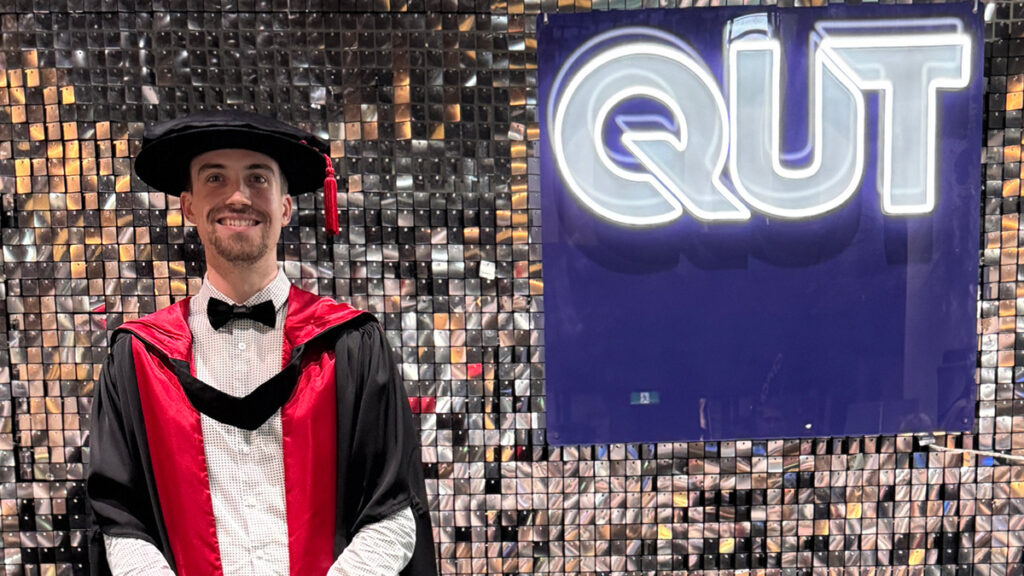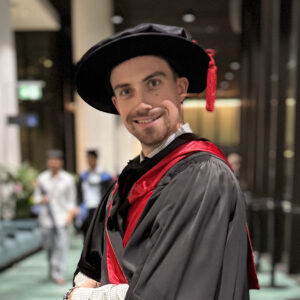
What was your PhD in?
My PhD focused on small-area statistics and their application to health, specifically cancer. I developed a set of statistical models to address the data sparsity issues commonly found in Australian survey data. These models helped improve the resolution and coverage of small-area health statistics across Australia. A highlight of my work was producing estimates of cancer risk factors, which are now publicly available in the award-winning Australian Cancer Atlas.
How did you come to do a PhD on this? Did things change along the way?
My master’s research thesis, completed at Cancer Council Queensland, explored spatial disparities in breast cancer. During that time, I was introduced to the Australian Cancer Atlas. When the opportunity came to pursue a PhD related to the Atlas, it was an easy decision as it was such a fantastic opportunity.
How was your PhD journey? Any surprises?
 Coming predominantly from a music background, diving into the theoretical and methodological underpinnings of small-area statistics was a steep learning curve. The first year felt like I was uncovering just how much I didn’t know! This made the next two years both highly productive and humbling as I worked to bridge the wide gaps in my statistical knowledge.
Coming predominantly from a music background, diving into the theoretical and methodological underpinnings of small-area statistics was a steep learning curve. The first year felt like I was uncovering just how much I didn’t know! This made the next two years both highly productive and humbling as I worked to bridge the wide gaps in my statistical knowledge.
One of the biggest surprises was the level of autonomy I had during my PhD. This independence allowed me to delve deeply into ideas, attend reading groups, engage in talks and seminars, and explore new areas of statistics at my own pace. It was an incredible opportunity for professional growth.
That said, such autonomy also came with challenges. There were times when I felt overwhelmed, unsure if I was making progress, and isolated. This experience taught me resilience and encouraged me to reach out for support from colleagues—a step I’m incredibly grateful for.
Did you do anything else at QUT besides your PhD?
I was lucky to be part of some really interesting projects outside my PhD work. I collaborated with Western Australia Health, developing better statistical models to improve the resolution and coverage of their health estimates. I also became a volunteer with the Good Data Institute, a fantastic not-for-profit that provides pro bono data science support to other charities.
One of the highlights was taking part in the United Nations Datathon—our team placed second in the world, which still feels a bit surreal! On top of that, I co-chaired a research group within the Centre for Data Science, where we ran fortnightly seminars for early-career researchers. These experiences made my PhD journey so much richer and gave me a chance to work with incredible people at QUT and externally.
How was your experience with the Data Science Centre?
My time with the Centre for Data Science was a period of significant professional growth. Being part of a centre that values cutting-edge research and innovation pushed me to expand my technical and soft skills in ways I didn’t anticipate. The opportunities I had through the Centre have left a lasting impact on my career, and I’m proud of what I achieved during that time. One of the highlights was being funded to travel to Canada twice (!), where I presented my work at two internationally renowned conferences.
What are you doing now?
I’m currently a Senior Data Scientist in the System Planning Branch at Queensland Health. It’s an exciting role where I get to work with an incredible amount of patient-level data from hospitals and health services across the state. My work focuses on developing health system forecasts to help predict hospital activity and support planning decisions. It’s incredibly rewarding to know that my statistical expertise helps to improve the quality and efficiency of Queensland’s already outstanding health system.